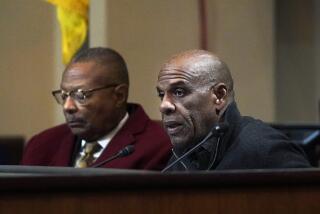Reparations miss the point
LAST WEEK, Prime Minister Tony Blair made an apology that was unusual in both subject and form. Writing in the New Nation, a newspaper for his country’s black population, he spoke of his “deep sorrow” for Britain’s role in the slave trade and slavery.
The occasion for this statement — and for much more official speechmaking to come — is the approaching bicentennial of the end of the British slave trade. In the decades before 1807, British ships carried nearly half the captive Africans brought across the Atlantic. Hence Britain’s banning of the trade that year — a measure its shipowners and West Indian planters fought long and bitterly — was a landmark on the path to ending slavery in the New World.
Slavery in the Americas was surely among the greatest of all human crimes. Here in the United States, and to an increasing extent in Britain as well, this cruel piece of history is at last part of the school curriculum in a way that it never was 50 years ago, so that our children now learn about the millions of people who died in chains in the dark holds of slave ships or who were worked to death on sugar, cotton or tobacco plantations.
But the debate goes on. Other than educating our children on the subject, and vowing to ensure that such inhumanity should never be repeated, what else should citizens of the former slaveholding countries do to make up for the past? Are apologies appropriate? Are they sufficient? What about reparations, which many people believe to be their logical consequence?
For some time, many Britons of West Indian descent have been demanding a formal apology and reparations for the terrible, lasting damage that slavery and the slave trade wrought. Black Americans, of course, have long asked the same, and a story in the New York Times this week about the movement of a number of African American Democrats into positions of power in Congress suggests that reparations may soon return to the agenda in Washington as well.
The Episcopal Church and its counterpart, the Church of England, have recently apologized for their ties to slavery, and several cases asking for reparations are working their way through American courts. Blair’s statement of sorrow at this “profoundly shameful” piece of the past goes further than any other Western leader has gone, although no president or prime minister on either side of the Atlantic has yet agreed to pay reparations.
To feel outrage at a dreadful crime in history is natural and right. But does it make sense to extend the principle of guilt and responsibility backward in time over generations? Two centuries ago, scholars estimate, about three-quarters of the people on Earth were slaves, indentured servants, laborers in debt bondage, serfs or in servitude of one sort or another. Add to that grim tally the wars, colonial conquests, genocides, concentration camps and other barbarities human beings have inflicted on each other since then. If we were to take responsibility for everything done by our ancestors, few of us — anywhere in the world — would have clean hands. Few of us, also, would be without victims among our forebears. The entire world would be awash in apologies.
Furthermore, even if we were to accept the illogical idea of inheriting guilt for our ancestors’ sins, how would we decide whose ancestors and which sins? Does an American whose grandparents came here after slavery ended — fleeing the Holocaust, say, or escaping poverty in Latin America — bear responsibility? And how would we gauge the reparations owed by someone in Africa today, whether peasant or prime minister, whose ancestors owned slaves and sold them to slave ship captains?
Assessing compensation for crimes committed by (and to) people who have been dead for generations is impossible to do fairly. Yes, we need to recognize the wrongs of the past, remember them, learn from them. But instead of demanding that they be somehow retroactively righted, we need to focus on the clear, glaring injustices of the present. That’s not only the better moral basis for political action, it’s far more likely to draw supporters than a dubious appeal to victimhood long ago.
How about a massive, comprehensive plan for job creation in our inner cities — not because so many residents of our poorer neighborhoods are descendants of slaves, but because they are caught in a vortex of joblessness, crime and drugs and are without such basic amenities as good, safe schools and health insurance?
Abroad, too, noble apologies for slavery will ring hollow as long as we tolerate an international economic playing field tilted against the poor. What matters is not lofty statements of regret but decisions taken by legislatures and at World Trade Organization meetings.
For example, in the United States and the European Union, lavish subsidies to farmers and corporate agribusiness mean that, on the world market, crops grown by poorer farmers in Africa cannot compete. If this multibillion-dollar welfare system for rich farmers were abolished, far more money would flow to Africa every year than would ever do so from any imaginable reparations payments for the slaves taken from that continent long ago.
As we remember slavery and the slave trade, we should also remember those who fought hard to bring them to an end: rebel slaves in the West Indies whose revolts hastened the end of British slavery, and feisty, determined abolitionists in Britain and the U.S. These people demanded action, not about the cruelties of earlier centuries but about the great injustices of their own place and time. The best way to honor their memory is for us to do the same.
More to Read
Sign up for Essential California
The most important California stories and recommendations in your inbox every morning.
You may occasionally receive promotional content from the Los Angeles Times.










